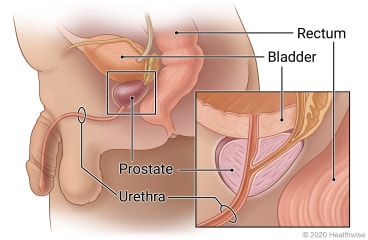
What is laparoscopic radical prostatectomy?
A laparoscopic radical prostatectomy is surgery to remove the prostate gland. It is usually done to treat cancer that has not spread out of the prostate. The doctor will make small cuts (incisions) in your lower belly. The doctor will put a lighted tube (scope) and other surgical tools through the cuts. Or if you will have robotic surgery, the doctor will guide the robot arms to do this surgery.
You will probably stay in the hospital for 1 or 2 days after surgery. Most people can go back to work or their usual activities 3 to 5 weeks after surgery. But it can take longer to fully recover.
After surgery, your body will need time to heal. It may take several weeks or more for you to regain control of your urine. And it may take 6 months or more for you to be able to have erections again. But with time, most people regain urine control and much of their previous sexual function. If not, medicines or other treatments may help.
After your surgery, you won't be able to ejaculate sperm. If you want to be able to have biological children after your surgery, talk to your doctor about your options. You may be able to save your sperm before the surgery.
How do you prepare for surgery?
Surgery can be stressful. This information will help you understand what you can expect. And it will help you safely prepare for surgery.
 Preparing for surgery
Preparing for surgery
- Be sure you have someone to take you home. Anesthesia and pain medicine will make it unsafe for you to drive or get home on your own.
- Understand exactly what surgery is planned, along with the risks, benefits, and other options.
- If you take a medicine that prevents blood clots, your doctor may tell you to stop taking it before your surgery. Or your doctor may tell you to keep taking it. (These medicines include aspirin and other blood thinners.) Make sure that you understand exactly what your doctor wants you to do.
- Tell your doctor ALL the medicines, vitamins, supplements, and herbal remedies you take. Some may increase the risk of problems during your surgery. Your doctor will tell you if you should stop taking any of them before the surgery and how soon to do it.
- Make sure your doctor and the hospital have a copy of your advance directive. If you don't have one, you may want to prepare one. It lets others know your health care wishes. It's a good thing to have before any type of surgery or procedure.
What happens on the day of surgery?
-
Follow the instructions exactly about when to stop eating and drinking. If you don't, your surgery may be canceled. If your doctor told you to take your medicines on the day of surgery, take them with only a sip of water.
-
Take a bath or shower before you come in for your surgery. Do not apply lotions, cologne, or deodorants.
-
Do not shave the surgical site yourself.
-
Take off all jewelry and piercings. And take out contact lenses, if you wear them.
At the hospital or surgery center
-
Bring a picture ID.
-
The area for surgery is often marked to make sure there are no errors.
-
You will be kept comfortable and safe by your anesthesia provider. You will be asleep during the surgery.
-
The surgery will take 3 to 4 hours.
-
You will have a tube that drains urine from your bladder. This is called a urinary catheter. It is usually left in place for 1 to 2 weeks.
-
You will have a tube coming out of your lower belly. This drains fluids that can build up after surgery. It is usually removed in the days after surgery.
When should you call your doctor?
- You have questions or concerns.
- You don't understand how to prepare for your surgery.
- You become ill before the surgery (such as fever, flu, or a cold).
- You need to reschedule or have changed your mind about having the surgery.
Where can you learn more?
Go to http://www.healthwise.net/patientEd
Enter H910 in the search box to learn more about "Laparoscopic Radical Prostatectomy: Before Your Surgery".
Current as of: October 25, 2024
Author: Ignite Healthwise, LLC Staff
Clinical Review Board
All Ignite Healthwise, LLC education is reviewed by a team that includes physicians, nurses, advanced practitioners, registered dieticians, and other healthcare professionals.

